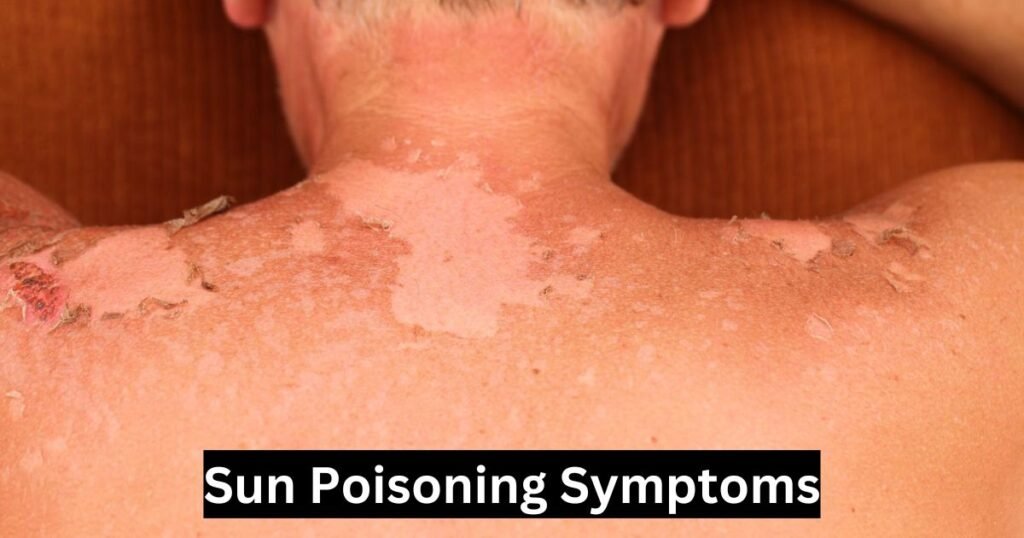When you think about spending time in the sun, it’s usually associated with fun activities such as going to the beach, hiking, or simply enjoying a sunny day outdoors. However, overexposure to sunlight can lead to sun poisoning, a severe reaction that can cause significant discomfort and harm to your skin. This post will provide an in-depth look at sun poisoning symptoms, its causes, effective treatments, and how you can protect yourself from this dangerous condition.
What is Sun Poisoning?
Before diving into the symptoms, it’s important to understand what sun poisoning is. Sun poisoning is a severe sunburn caused by prolonged exposure to the sun’s ultraviolet (UV) rays. It is not a formal medical term but is often used to describe the intensity of sunburn that causes blistering, severe pain, and other symptoms. Unlike a typical sunburn, sun poisoning involves more extreme reactions that can affect the entire body, leading to dehydration, chills, fever, and in some cases, skin damage that lasts for weeks.

Common Sun Poisoning Symptoms
There are several distinct sun poisoning symptoms that can indicate a more serious condition than a mild sunburn. The following are the most common signs you might experience after spending too much time under the sun:
1. Severe Redness or Skin Inflammation
A mild sunburn usually causes some redness and discomfort, but with sun poisoning, the redness is much more intense. The skin becomes hot to the touch, inflamed, and may even blister in more severe cases. This inflammation can extend beyond the sun-exposed areas, and you may feel discomfort even in areas where the sun hasn’t directly hit.
2. Blistering and Peeling
One of the most noticeable symptoms of sun poisoning is the formation of blisters on the skin. These blisters are filled with clear fluid and can be quite painful. The skin may begin to peel as the body attempts to heal from the burn. Peeling skin is a sign that your body is shedding damaged cells and attempting to regenerate healthier skin.
3. Nausea and Vomiting
Sun poisoning can affect your entire body, not just your skin. Nausea, vomiting, and dizziness are common systemic symptoms that occur when the body is overwhelmed by prolonged sun exposure. If you feel nauseous or faint after being out in the sun, it’s important to get medical attention immediately, especially if you experience other sun poisoning symptoms.
4. Headaches and Dizziness
Dehydration and heatstroke can occur alongside sun poisoning, leading to severe headaches, dizziness, and a feeling of being lightheaded. These symptoms are often signs that the body is overheating and unable to regulate its temperature. It’s crucial to stay hydrated and cool down as soon as possible to prevent further complications.
5. Fever and Chills
Another symptom of sun poisoning is the onset of a fever. You may experience chills as your body tries to cool itself down. A fever may signal an infection or an inflammatory response from the body due to the damage caused by UV radiation.
6. Swelling of the Skin
Swelling is another common symptom associated with severe sunburn and sun poisoning. The skin may become puffy and sensitive, and in some cases, you may notice swollen lymph nodes, particularly around the affected area.
7. Rapid Heartbeat and Shortness of Breath
In extreme cases of sun poisoning, you may experience a rapid heartbeat (tachycardia) or difficulty breathing (dyspnea). These symptoms can be alarming and suggest that your body is experiencing significant distress. Seek medical attention immediately if these symptoms occur.
Causes of Sun Poisoning
Sun poisoning occurs when the skin is exposed to an excessive amount of ultraviolet (UV) rays from the sun. UV radiation damages the skin cells, leading to inflammation and the release of inflammatory molecules. This results in the symptoms mentioned above. There are several factors that can increase the risk of sun poisoning:
- Fair Skin: People with fair skin, light eyes, and red or blonde hair are more susceptible to sunburn and sun poisoning due to a lack of melanin, the pigment that protects the skin.
- Prolonged Exposure: Spending extended periods of time outdoors, particularly between 10 a.m. and 4 p.m. when UV rays are the strongest, increases the likelihood of developing sun poisoning.
- Previous Sunburns: If you’ve experienced sunburns in the past, your skin may be more vulnerable to future sun damage.
- Lack of Sunscreen: Not wearing sunscreen or applying it incorrectly can significantly increase the risk of developing sun poisoning. Sunscreen helps block harmful UV rays that can cause skin damage.

How to Treat Sun Poisoning
If you experience sun poisoning symptoms, prompt treatment is essential to alleviate discomfort and reduce the risk of complications. Here are some steps you can take to treat sun poisoning at home:
Get Out of the Sun
The first and most crucial step is to stop further exposure to the sun. Seek shade or go indoors to avoid worsening the symptoms. Rest and relax in a cool area while allowing your body time to heal.
Cool the Skin
Taking a cool (but not cold) bath or shower can help soothe the skin and reduce inflammation. Avoid using harsh soaps or scrubbing the skin too hard. You can also apply cool compresses to affected areas to help reduce heat and pain.
Hydrate
Sun poisoning can cause dehydration, so it’s vital to drink plenty of fluids, such as water, sports drinks, or electrolyte solutions. This helps replace lost fluids and prevent complications like dizziness or heatstroke.
Apply Aloe Vera
Aloe vera gel is a popular natural remedy for sunburns and sun poisoning. It has soothing, anti-inflammatory properties that can help reduce redness, swelling, and pain. Apply aloe vera gel generously to affected areas, but avoid products with added fragrances or alcohol, as they can irritate the skin further.
Use Over-the-Counter Creams
Over-the-counter hydrocortisone creams or other anti-inflammatory creams can help reduce redness and swelling. Be sure to follow the instructions on the product label and avoid applying it on broken skin or open blisters.
Take Pain Relievers
If you’re experiencing pain from sun poisoning, over-the-counter pain relievers such as ibuprofen or aspirin can help reduce inflammation and alleviate discomfort. Make sure to follow the recommended dosage and consult a healthcare provider if you have concerns.
Seek Medical Attention
If your symptoms are severe or if you experience difficulty breathing, a rapid heartbeat, or confusion, seek immediate medical attention. Severe cases of sun poisoning may require professional medical intervention, such as intravenous fluids, medications, or even hospitalization.
Preventing Sun Poisoning
Preventing sun poisoning is all about minimizing sun exposure and protecting your skin. Here are some steps you can take to prevent sunburn and sun poisoning:
- Apply Sunscreen: Always use a broad-spectrum sunscreen with an SPF of 30 or higher. Reapply it every two hours and after swimming or sweating.
- Seek Shade: Avoid being outside during peak sunlight hours (usually from 10 a.m. to 4 p.m.). Stay in the shade as much as possible.
- Wear Protective Clothing: Wear a wide-brimmed hat, sunglasses, and long-sleeved clothing to protect your skin from direct sunlight.
- Stay Hydrated: Drink plenty of water throughout the day, especially when spending time outdoors in the sun.
See Also: gossiips.com
Conclusion
Sun poisoning is a serious condition that can lead to severe pain, discomfort, and even long-term skin damage. By recognizing the symptoms early and taking the necessary steps for treatment and prevention, you can protect yourself from the harmful effects of sun exposure. If you experience severe sun poisoning symptoms, don’t hesitate to seek medical attention.
Remember, prevention is key! Always protect your skin from harmful UV rays, stay hydrated, and seek shade when possible. Your skin’s health is important, and with the right precautions, you can enjoy the sun safely.



